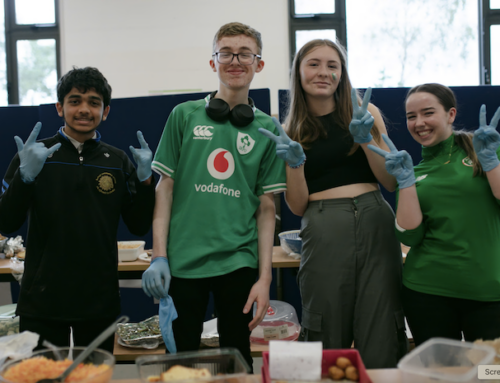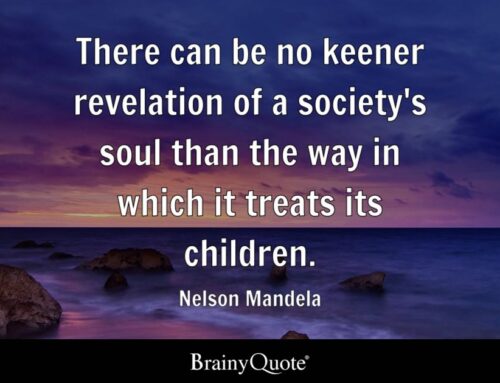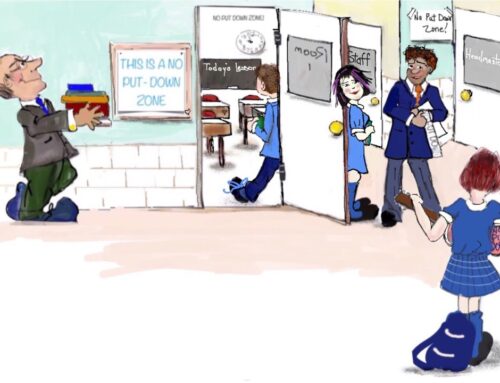Recently I gave a talk to parents about the building blocks of resilience and what they could do at home.
I began by saying that in common with most parents when I first held my new-born in my arms I was overwhelmed with feelings of love and protection. I looked down at the sleeping baby and whispered “I want you to be happy, I will do everything I can to make you happy”.
My daughter is now a grown woman and I know now that this wish was not only futile, but also risked overlooking what really mattered. What my child needed was to learn how to be whole, not happy. Life does not run smoothly, all of us have struggles from time to time, and we all need to have strategies on hand to cope well with these. How do we put ourselves back together when things are falling apart?
When children have and learn these building blocks of resilience, reinforced throughout their childhood, they have more chance of being and staying whole. It is only then that real happiness can flourish. Parents who try to solve their children’s problems for them, or want to prevent them from ever feeling bad, are not doing them a service – in fact the opposite.
So how can parents help? Above all else, children need to be surrounded by warm, healthy, supportive and inclusive relationships. When this happens they not only have a sense of security for themselves they also have models of how to connect well with others. Children watch, children listen, children copy. This love and care is vital, but parents also need to encourage independence, responsibility and helpful thinking.
When things get tough for children, as they inevitably will do from time to time, we need to take what is happening for them seriously and validate how they feel, not try and cheer them up or tell them to look on the bright side. Unless children feel properly ‘heard’ they will find it difficult to listen. We then have choices. Either with kind but misguided intentions, we try and make it all better – or we can teach them how to rise to the challenge.
We can do this by asking good questions. These might include:
- What do you want to happen? Not just tomorrow but in the long run.
- What do you have control over? (what you do and say)
- What can’t you do anything about? (such as someone else’s behaviour)
- What options do you have? List everything you can think of.
- Choose two strategies and go through the positives and negatives of each. This includes who might help so you don’t feel alone.
- Which one looks like the best to go for? This is Plan A.
- What is your Plan B if that one doesn’t work out?
- What are you going to do first?
- How are you feeling about things now?
This conversation is not only supportive, it also gives the child a sense of empowerment and stops them feeling a victim. Show how proud you are of how they are handling things.
Another strategy that promotes wholeness is to raise awareness that there is always more than one way to think about things. Some of that thinking is helpful and some is not. Unhelpful thinking includes personalising issues, e.g.: “why does this always happen to me?” Children need to know that things like failure, loss and bad luck are part of life – they happen to everyone: how you deal with difficulties will make the difference to whether they overwhelm you or not. Being able to talk with others is a significant protective factor, so parents need to encourage this by talking with their child at a level they can understand. For younger children, reading books together can be helpful when parents ask questions such as “what do you think teddy would be feeling when this happened?” or “what makes rabbit such a good friend?” For older children, watching TV programmes or films together can provide the same opportunities.
Although being cheerful all the time is not realistic or even appropriate, having an authentic positive outlook on life is a powerful asset. Parents can foster this in two ways: helping children get things in perspective, and focusing on what they can be thankful for. When something negative is taking up all the emotional energy, it is worth reminding a child of the positive things that are still in place. Children sometimes get lost in fearful imaginings, and bringing them back to what is real can help with perspective. In the case of family breakdown, for instance, children need to be told what will be happening and especially what will still be the same – such as that they will continue to see both parents who still love them.
 That thankfulness can counter depression is now well founded in research. Learning how to do this takes practice, as the default position is often the negative. Helping children focus on blessings can be done in several ways. Ask them what was the best (or most interesting) thing they learnt in school today, what did they enjoy the most about an outing, or simply what do they feel thankful for today. Verbalising what you are grateful for yourself models this way of thinking, e.g.: “I am so lucky to have a warm house in this cold weather”; “Thank you for making me a cup of tea –I am so pleased I have children who are kind.”
That thankfulness can counter depression is now well founded in research. Learning how to do this takes practice, as the default position is often the negative. Helping children focus on blessings can be done in several ways. Ask them what was the best (or most interesting) thing they learnt in school today, what did they enjoy the most about an outing, or simply what do they feel thankful for today. Verbalising what you are grateful for yourself models this way of thinking, e.g.: “I am so lucky to have a warm house in this cold weather”; “Thank you for making me a cup of tea –I am so pleased I have children who are kind.”
An experience my daughter had recently demonstrates the above strategies in practice. Emma had been engaged as a photographer’s assistant in Belgium and Germany and was excited at the prospect of a week’s adventure. In Brussels, she got off the Eurostar train and went to book a hire car. While she was signing papers for this her bag, containing all her camera equipment and laptop, was stolen. She texted the family with this news, adding: “I am about as pissed off as it is possible to be!” This elicited many immediate messages of support – positive connections with others are critical. Emma quite quickly found a sense of perspective: “It’s just stuff, it can be replaced, no-one died”. She was grateful to still have her purse, passport, cards and clothes. Being the driver was also useful, because it gave her something else to focus on. She problem-solved by doing all the paperwork necessary for an insurance claim, and finally was able to appreciate the beauty of the places they visited and the experience that the job offered. Despite everything, Emma’s misadventure had not dominated the week and her overall view when she returned home was that it had been a good one. This way of being is not foolproof but by and large it helps keep you whole – and this opens the door to happiness. As parents it is a priceless gift we can give our children.
To help children learn more about positive and negative thinking see: wellbeingstories.com








Leave A Comment
You must be logged in to post a comment.